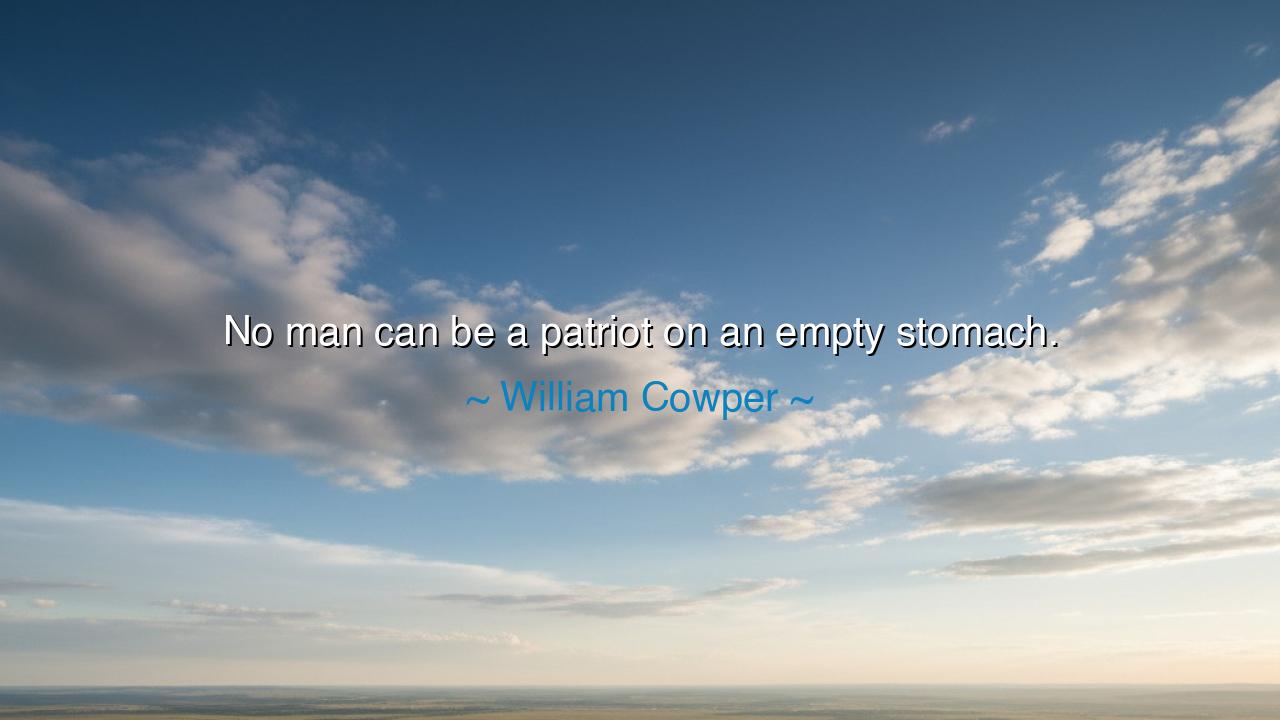
No man can be a patriot on an empty stomach.






The poet William Cowper once spoke with unflinching clarity: “No man can be a patriot on an empty stomach.” In this saying, we find a truth as old as humanity itself—that lofty ideals and noble duties cannot endure when the body cries out in hunger. The heart may burn with zeal, and the mind may dream of sacrifice, but if the belly is hollow and the limbs are weak, then the fire of devotion cannot be sustained. The words remind us that before the spirit can soar, the flesh must be fed, and that a nation’s greatness rests not only on its banners and its songs, but on the bread its children eat.
Consider the ancients, who understood that armies do not march on speeches but on rations. Alexander the Great could conquer worlds only because his soldiers had grain caravans trailing his legions. The Roman legions, unmatched in their might, carried with them not only swords and shields, but stores of wheat and salted meat. They knew that hunger is the great betrayer; it steals courage from the strongest heart and clouds the noblest vision. Where hunger rules, patriotism withers, for one cannot think of defending the homeland when the body is faint and the family unfed.
Let us recall the winter of 1777, when General Washington’s men shivered at Valley Forge. Their loyalty to the new republic was great, but their stomachs were empty. They marched barefoot in the snow, their bellies gnawed by hunger, their spirits nearly broken. Yet it was when bread finally reached them, when supplies restored their strength, that they endured the frost and turned despair into victory. Without sustenance, their patriotism would have been no more than fading embers; with food, it blazed anew into the fire of independence.
The wisdom of Cowper is not merely for soldiers. It speaks also to the life of every citizen. How can the laborer love the land when his children starve? How can the scholar dream of truth when his body is faint from want? Patriotism begins with bread, for the soul’s wings cannot rise until the body’s burden is eased. A nation that neglects the hunger of its people cannot demand loyalty from them; to do so would be to demand flame from ashes.
Yet, beyond the political realm, there lies also a personal lesson. To those who aspire to virtue, to justice, to the service of others, this teaching warns us: strengthen your body that your spirit may endure. A weary, starving vessel cannot hold the wine of courage. Care for your health, nourish yourself, and you will find your heart more ready to serve others and your mind more steadfast in noble resolve.
The call is clear: if we wish for patriotism, if we wish for loyalty, if we wish for greatness, let us first ensure that no man, no woman, no child suffers hunger. Feed the people, and their love will rise like the morning sun. Neglect their need, and their loyalty will wither like grass beneath drought. Nations are built not only by laws and dreams, but by bread shared at the common table.
Therefore, let this be the lesson for those who hear: do not despise the simple duty of feeding the hungry. Support your neighbor, give to the poor, labor honestly so that your family does not lack, and never forget that the flame of patriotism begins in the humble hearth where bread is broken. When stomachs are filled, hearts can beat bravely for a cause greater than themselves. When the table is full, the nation stands strong.
And so we inherit the wisdom of Cowper: that the love of country is not sustained by words alone, nor by banners, nor by speeches, but by the nourishment of body and soul. Let every generation remember this, and let none expect devotion from the unfed. For as the ancients knew, and as every hungry man can testify, no man can be a patriot on an empty stomach.






AAdministratorAdministrator
Welcome, honored guests. Please leave a comment, we will respond soon